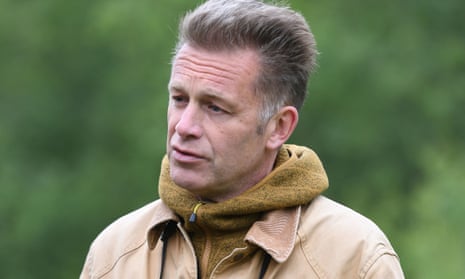Wildlife and environmental TV programmes have “failed wholeheartedly” in the past to spark action on the climate, biodiversity loss and the growing human population, Chris Packham has told an audience of TV executives.
The Springwatch presenter said that although recent series had “turned a corner”, programme-makers must “shout more loudly” to tell the truth about environmental crises and call out politicians’ lies.
He said future generations may come to regard today’s leaders such as Donald Trump, Vladimir Putin, Jair Bolsonaro and Scott Morrison in a similar way as current generations see Hitler, Stalin and Pol Pot, because they could by then have caused the deaths of millions of people.
“If we let them, they have the capacity to become genocidal maniacs because of their inactions, because of their actions when it comes to caring for our planet,” he said in the annual Bafta television lecture at the Barbican in London on Tuesday evening.
Packham, whose Horizon documentary 7.7 Billion People and Counting was broadcast on BBC Two on Tuesday night, read the audience a short story he had written, set in a future where starving people queue to look at the last tree on the planet. He said science fiction might become science fact given the rising population, the “terrifying” collapse in biodiversity and the Intergovernmental Panel on Climate Change’s warning that runaway global heating must be tackled within 10 years.
In a video segment filmed in Tanzania, Packham said he was often told while making wildlife documentaries that it was not his job to make statements of environmental fact, “because that’s news, that’s something that’s got to be reported by journalists”. He said the recent UK general election had been marked by many journalists’ failure to challenge lies.
“If someone tells you it’s sunny and someone else tells you it’s raining, you don’t quote them both, you look out of the bloody window and see whether it’s sunny or raining and then you tell the truth about it,” he said.
“At this point in time, when it comes to environmental journalism, it is dangerous to lie because we have to tell the truth. Truth is the most essential component of progress.”
Packham added: “For most of the last 30 or 40 years we’ve been making bits of the world look like paradise, absolute utopias. We go to places, there are never any people there, everything is functional, everything is beautiful. OK, we’ve excited people, we’ve fascinated people, we’ve shown them things they could never, ever have dreamed of, and they have fallen in love with that environment through awe and wonder and affinity – but has their love actually transformed into making a real difference? No.”
Packham praised Blue Planet II for bringing plastic pollution to global attention and the One Show’s campaign to raise awareness on the same issue. The BBC’s Seven Worlds, One Planet contained some “hard-hitting stuff”, he said.
“We are starting to make these programmes and the BBC has a real commitment to make more,” he told the Guardian before the speech, describing his Horizon documentary as “like a smack in the face with a sledgehammer”.
“It’s going to hurt a lot,” he said. “It’s pretty hardcore. It’s the hardest programme the BBC have done yet.”
Packham said Bafta’s We are Albert campaign, which encourages the film and TV industries to reduce their environmental impact, was a step in the right direction but he urged programme-makers to set meaningful targets to become carbon neutral within three years.
He described recent environmental TV productions that used single-use plastic, where crew members flew home for weekends and where two camera operators flew to a location in a private jet. Such practices were “an open door for enormous and justified criticism”, he said.
He told the audience: “You’re going to say it’s going to come with a cost, budgets are getting smaller. They are not getting as small as the wildlife populations out here in the world … you can’t have your cake and eat it too. It’s that simple.”
